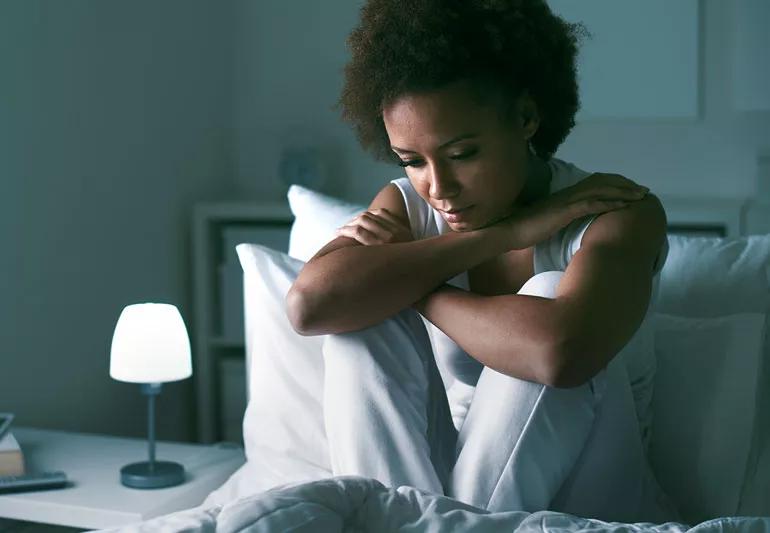How poor sleep harms you — and how to catch more ZZZs

You know that sleep is a pillar of good health, along with a nutritious diet and regular activity. Not getting the recommended seven to nine hours of slumber a night can contribute to a host of health problems, from higher blood pressure to an increased risk of obesity.
Advertisement
Cleveland Clinic is a non-profit academic medical center. Advertising on our site helps support our mission. We do not endorse non-Cleveland Clinic products or services. Policy
But what if your sleep woes happen just occasionally? Can one miserable night of tossing and turning have negative impacts on your health?
Pulmonologist and sleep disorders specialist Samuel Gurevich, MD, explains how a sleepless night affects your mental and physical health — and how to get more shut-eye.
If you were up in the wee hours last night, odds are you’re feeling it today. “Sleep is important because being awake is important,” Dr. Gurevich says. “And one or two nights of bad sleep can impair your ability to function well the next day.”
Too little sleep — even for just one night — can leave you dealing with several unpleasant cognitive effects:
Those effects do more than sour your mood (and make you reach for more coffee). “Paying attention to your surroundings and your reaction time are processes that keep us safe and on task,” Dr. Gurevich says.
When those processes aren’t working as well as they should, it can impair your performance at work or school and even put you at risk of car crashes or other accidents, explains Dr. Gurevich.
Advertisement
When you don’t get enough sleep night after night over the long term, it can lead to all sorts of physical effects — including problems for your heart health.
But even a few missed nights of sleep can take a physical toll on your body, Dr. Gurevich says. “Lack of sleep causes an increase in stress hormones,” he explains. “That triggers your resting heart rate and blood pressure to increase.”
Those changes aren’t usually worrisome if they happen occasionally. “The body and brain recuperate quite well from one or two sleepless nights,” says Dr. Gurevich. “But if it stretches into a month or more, that can have lasting impacts on your heart health, mental health and cognitive abilities.”
Sleep isn’t just idle time. Many important body processes are happening while you snooze. A good night’s rest benefits your health and well-being in some important ways:
Sleeping helps to lock memories into your brain. When you’re sleep-deprived, you’re less able to remember things you learned while you were awake. Sleep also helps your brain regulate emotions. That’s why you might feel irritable and moody after a poor night’s rest.
While you sleep, your body is hard at work repairing itself by releasing proteins and hormones that help restore damaged tissues, including muscles. If you’re sleep-deprived, your body heals more slowly. This tissue repair process is also important for helping athletes build muscle and recover from a workout.
Sleep helps boost your body’s ability to fight illness. During slumber, the body produces cytokines — proteins that direct immune cells to fight inflammation throughout the body.
Researchers have also found that sleep deprivation increases your body’s production of white blood cells, the same response the body shows when exposed to significant stress. That imbalance in your immune system is associated with illnesses such as heart disease.
You want to sleep well and get the amount of sleep you need. So why isn’t your brain cooperating? Unfortunately, falling asleep and staying asleep doesn’t always come easily. Dr. Gurevich offers these tips for natural sleep remedies.
Advertisement
“It takes some time to learn these skills,” says Dr. Gurevich, “but it pays dividends over your lifetime.”
Advertisement

Sign up for our Health Essentials emails for expert guidance on nutrition, fitness, sleep, skin care and more.
Learn more about our editorial process.
Advertisement

To avoid sleep deprivation and shift work sleep disorder, try adopting habits that minimize light exposure and prioritize daytime sleep

Sleep disorders, mental health conditions and other health concerns can all affect the quality of your sleep

Most people fall asleep within 10 to 20 minutes, but if your experience is different, adjusting your sleep schedule may help

Stick to a consistent schedule, be mindful of screen time and work on reducing your stress levels before bed

Napping can boost focus, memory and mood — if you time it right
These devices can help shed light on what’s happening with your body during rest

Keep a dream journal, set your intentions before bed and make sure you’re getting a full night of high-quality sleep

Controlling your dreams may help you tap into your creativity and even reduce anxiety

Even small moments of time outdoors can help reduce stress, boost mood and restore a sense of calm

A correct prescription helps your eyes see clearly — but as natural changes occur, you may need stronger or different eyeglasses

Both are medical emergencies, but they are very distinct events with different causes